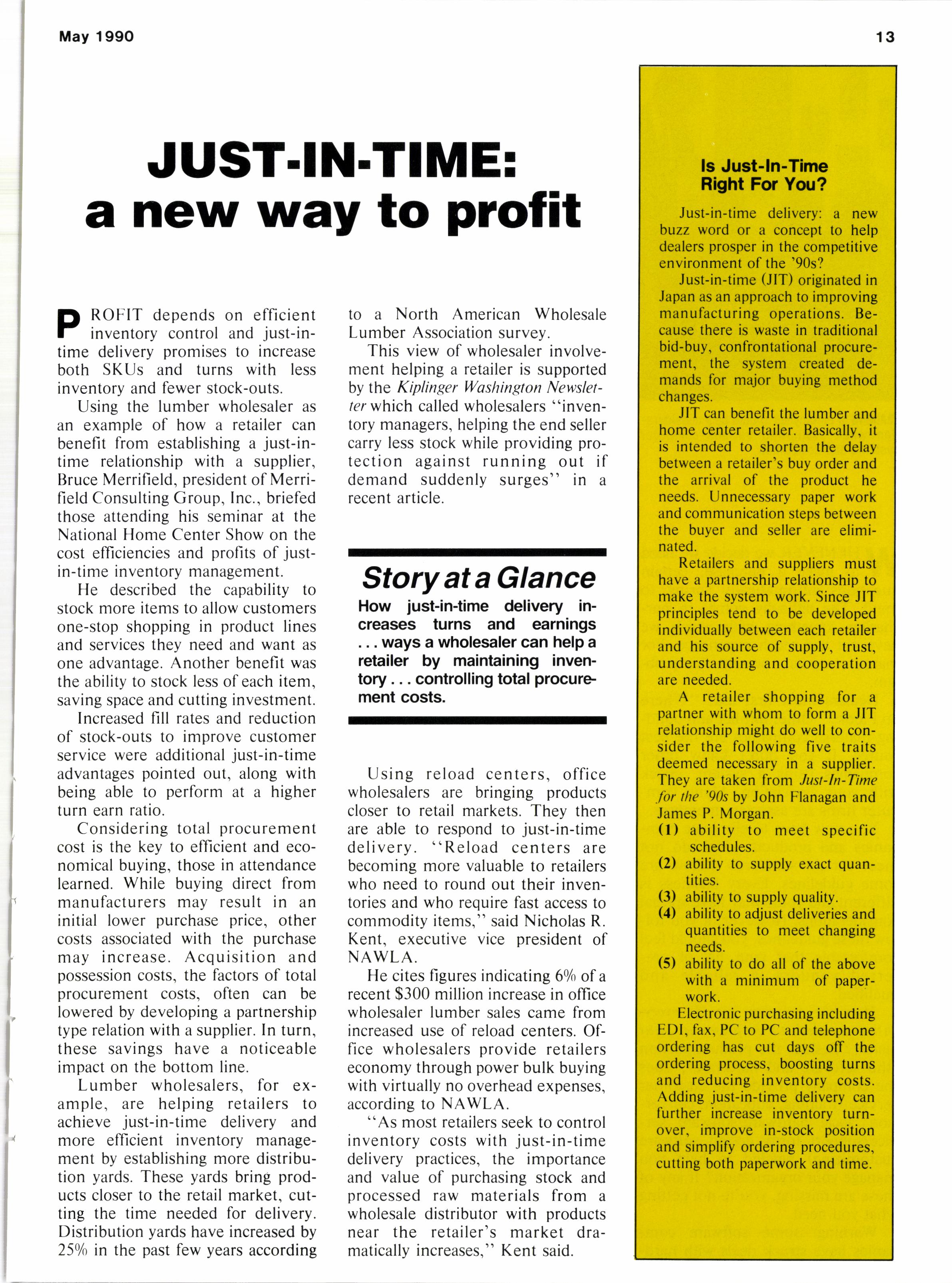
3 minute read
JUST.IN.TIME: a new way to profit
D ROt-lT depends. on el-l-icient f inventory control and just-intime delivery promises to increase both SKUs and turns with less inventory and fewer stock-outs.
Using the lumber wholesaler as an example of' how a retailer can benefit from establishing a just-intime relationship with a supplier, IJruce Merrifield, president of Merrilleld Consulting Group, Inc., brief'ed those attending his seminar at the National Honre Center Show on the cost efficiencies and profits of justin-time inventory management.
He described the capability to stock more items to allow customers one-stop shopping in product lines and services they need and want as one advantage. Another benefit was the ability to stock less of each item, saving space and cutting investment.
Increased flll rates and reduction of stock-outs to improve customer service were additional just-in-time advantages pointed out, along with being able to perlbrm at a higher turn earn ratio.
Considering total procurement cost is the key to elficient and economical buying, those in attendance learned. While buying direct from manufacturers may result in an initial lower purchase price, other costs associated with the purchase may increase. Acquisition and possession costs, the factors of total procurement costs, ofien can be lowered by developing a partnership type relation with a supplier. In turn, these savings have a noticeable impact on the bottom line.
L umber wholesalers. fbr example, are helping retailers to achieve just-in-time delivery and more e{ficient inventory management by establishing more distribution yards. These yards bring products closer to the retail market. cutting the time needed for delivery. Distribution yards have increased by 250h in the past few years according to a North American Wholesale Lumber Association survey.
This view ol wholesaler involvement helping a retailer is supported by lhe Kiplinger Washington Newslettcr which called wholesalers "inventory managers, helping the end seller carry less stock while providing protection against running out il denrand suddenly surges" in a recent article.
Story at a Glance
How just-in{ime delivery increases turns and earnings ways a wholesaler can help a retailer by maintaining inventory.. controlling total procurement costs.
LJsing reload centers, office wholesalers are bringing products closer to retail markets. They then are lble to respond to just-in-time delivery. " Reload centers are becoming more valuable to retailers who need to round out their inventories and who require fast access to conrmodity itenrs," said Nicholas R. Kent, executive vice president of NAWLA.
He cites figures indicating 6oh of a recent $300 million increase in office wholesaler lumbcr sales came from increased use of reload centers. Office wholesalers provide retailers economy through power bulk buying with virtually no overhead expenses, according to NAWLA.
"As most retailers seek to control inventory costs with just-in-time delivery prirctices. the importance and value of' purchasing stock and processed raw materials from a wholesale distributor with products near the retailer's market dramatically increases," Kent said.
ls Just-ln-Time Right For You?
Just-in-time delivery: a new buzz word or a concept to help dealers prosper in the competitive environment of the '90s?
Just-in-time (JIT) originated in Japan as an approach to improving manufacturing operations. Because there is waste in traditional bid-buy, confrontational procurement, the system created demands for major buying method changes.
JIT can benefit the lumber and home center retailer. Basically, it is intended to shorten the delay between a retailer's buy order and the arrival of the product he needs. Unnecessary paper work and communication steps between the buyer and seller are eliminated.
Retailers and suppliers must have a partnership relationship to make the system work. Since JIT principles tend to be developed individually between each retailer and his source of supply, trust, understanding and cooperation are needed.
A retailer shopping lor a partner with whom to lorm a JIT relationship might do well to consider the following five traits deemed necessary in a supplier. They are taken lrom Just-ln-Time ./br the '90s by John Flanagan and James P. Morgan.
(l) ability to meet specific schedules.
(2) ability to supply exact quantities.
(3) ability to supply quality.
(4) ability to adjust deliveries and quantities to meet changing needs.
(5) ability to do all of the above with a minimum of paperwork.
Electronic purchasing including EDI, fax, PC to PC and telephone ordering has cut days off the ordering process, boosting turns and reducing inventory costs. Adding just-in-time delivery can further increase inventory turnover, improve in-stock position and simplily ordering procedures, cutting both paperwork and time.
Inlltlt0 of employees should be a consideration when evaluating various computer systems and companies.
f f t HENEVER we decide we need UU to make a purchase, certain questions automatically spring to mind. The difliculty comes in purchasing something with which we have not had much experience. For many, computers present this problem.
Dealers must first ask, "Where do I look?" Other lumber and building material companies are the best source. lf you don't know other companies using a system, check with your association. Many computer firms are associate members.
You now have to eliminate companies and products which do not meet certain standards. Below are some guidelines. Every business is different and yours may have special considerations. However, if you follow these guidelines, you should feel comfortable that your list of preferred vendors is reliable and qualified.
Does the company provide everything needed to implement your system? Besides the product portion (the software and hardware). does the company provide the customer service (training, education, conversion, local hardware/software service/support, forms design, software customizing) needed to help you manage your organization? If any of these are missing, you're not getting what you need.
Warning: some software companies have struck deals with hard-










